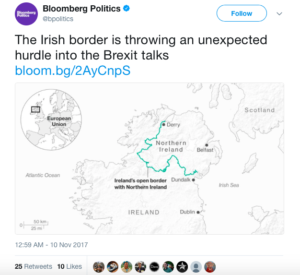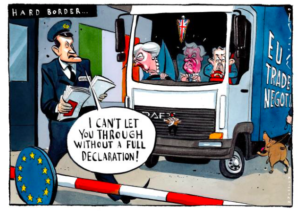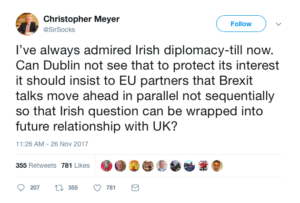Theresa May has a week to demonstrate that ‘sufficient progress’ has been made on three core issues: the ‘divorce’ bill, EU citizens’ rights, and the Irish border. If not, then the EU will not proceed to discuss future trade arrangements.
The first two were always going to be the easiest bits of the jigsaw. Yes, the precise amount of money offered by the UK as part of the ‘divorce’ bill will be politically sensitive, but it’s hardly an intractable issue. The issue of citizens’ rights will be trickier, but there have been high-level suggestions that the European Court of Justice will retain some sort of limited role through a “referral system.” A compromise is in train.

It is the sudden surprise at how difficult it is to satisfactorily resolve the third issue – the Irish question – that is, frankly, beyond surprising.
It’s not just the UK government that has been caught off guard. It’s the media as well. Earlier this month, Bloomberg reported that the Irish border was presenting an “unexpected” challenge in the Brexit negotiations.
It’s a problem that’s been lying in plain sight ever since the referendum was called. During the campaign it was pointed out that if Britain was going to ‘take back control’ of its borders, it actually had a land border that would need to be, well, controlled. That might not have been such a problem, however, if the UK gave its commitment to staying inside the Customs Union and the Single Market.
A cul-de-sac
On the contrary, the government has willingly backed itself into a cul-de-sac. Theresa May has been insistent that leaving the EU means leaving the Customs Union and Single Market – despite key Leave advocates repeatedly denying this would be the case during the campaign itself.
If the UK is outside of the Customs Union and the Republic of Ireland is inside, a hard border on, or around, the island is inevitable.

Peter Brookes in The Times
This position has attracted remarkably little opposition from the Labour Party. In fact, just last week Labour MPs were told to vote against an amendment that would have effectively kept the UK in the Customs Union. This might have been a wasted opportunity to articulate a very different kind of Brexit to the path being pursued by the Conservative government.
The position has also attracted remarkably little opposition from the minority government’s Northern Irish backers. Quite the opposite. Even after the general election and the chance to influence the government’s Brexit negotiating position, the DUP seemed to harden its rhetoric against Britain’s continued place in the Customs Union. Another wasted opportunity.
And so, in the absence of internal dynamics causing the UK government to revise its stance on the Customs Union, we have seen the Irish government becoming increasingly vocal on the issue. Perhaps it had been counting on the penny to drop without having to intervene. It’s been 17 months since the referendum, so presumably British officials will have come to appreciate the complexities of the Irish border.
Not so. As Alex Massie wrote in The Spectator, the constitutional, logistical and political reality simply hasn’t set in yet:
One need only listen to what David Davis and Boris Johnson have said about the Irish Question to understand that the Irish have thought longer and harder about this than their British counterparts. Sometimes you get the impression the existence of an EU-frontier still surprises London. But then Northern Ireland is usually only – and at best – an afterthought. Of us, but not quite of us and certainly different enough for the difference to count.
Either that’s the case, or else members of the government are fully aware of the implications of its stance and are hoping that the EU blinks first. Over the weekend, Liam Fox doubled down with an uncompromising position on Sky News:
We don’t want there to be a hard border but the UK is going to be leaving the Customs Union and the Single Market.
We have always had exceptions for Ireland – whether it’s in our voting rights, our rights of residence in the UK, we have always accepted a certain asymmetry and that will have to be part of whatever agreement we come to with the European Union but we can’t come to a final answer to the Irish question until we get an idea of the end state.
This really is a remarkable statement from the International Trade Secretary. For well over a year, the UK government has insisted that there will be no hard border in Ireland. If this is a genuine commitment, rather than simply a rhetorical aspiration, then the UK government would configure its broader position to make this commitment achievable.
Instead, as Liam Fox states, the UK government’s primary commitment is to leaving the Customs Union and Single Market. The border issue is, thus, a secondary issue in his eyes. His focus is boldly outward; around the world there are apparently dozens of countries forming a stampede to do trade deals with the UK. When you’re looking so far into the horizon, it appears that you don’t see – or don’t want to see – the consequences on your own doorstep.
Undiplomatic relations
A sense of frustration with the Irish government is palpable, from the press to former diplomats. The Sun, undiplomatically, told Leo Varadkar to “shut his gob and grow up.”

Meanwhile, Britain’s former ambassador to the United States, Sir Christopher Meyer, put it (a bit) more politely. In a tweet, he echoed Liam Fox’s call for the Irish border issue to be discussed at a later stage, allowing progress to be made on trade talks. If basic principles over the future nature of the border cannot be agreed before trade talks commence, then, by definition, the future nature of the border remains up for discussion. Apparently it isn’t worth ruling out a hard border.
This reveals how little so many politicians, journalists and diplomats seem to respect the delicacy of the Irish question. They quote trade figures. They call for Ireland to leave the EU as well as Britain. They warn that it will be worse off than the UK if the Brexit negotiations end in failure.
These sentiments reflect arrogance in a fairly transparent sense, but also arrogance in a much deeper historical sense.
Let’s rewind 66 years.
When the EU was founded as the European Coal and Steel Community in 1951, its overarching goal wasn’t economic or social. It was, indeed, deeply political: to help instil and preserve peace across a continent that had been repeatedly torn apart by war. It had a mission of reconciliation on a continental scale.
The UK was largely on the sidelines, leaving the project to be driven by France and Germany. It wasn’t until the British economy stagnated in the 60s that the economic incentive of joining (what was to become the European Economic Community) became much clearer. After it joined the organisation in 1973, it would always be the ‘awkward partner’ – keen to reap the economic benefits of EEC membership without ever really being committed to the political language of ‘ever closer union’.
But there’s another part of the story. When Britain joined the EEC in 1973, so too did another country: Ireland. It has been through membership of (what would become) the European Union that relations between Britain and Ireland would vastly improve at the state level. The two countries cooperated as firm and reliable partners within the space offered by joint EU membership.
What’s at stake
More importantly, it was the joint membership of the European Union that helped create the conditions to bring about and consolidate the Good Friday Agreement in Northern Ireland. No, the EU wasn’t directly responsible for peace, but it provided both governments with a framework for the border. Over and above any trade benefits, the open border between north and south has immeasurable symbolic importance. It is a powerful demonstration that Northern Ireland can be simultaneously in the UK and yet lack any physical separation from the Republic of Ireland.
This might seem like an incredibly basic statement to make, given the deeper complexities involved. It is. But it reflects an equally simple reality: symbolism matters a great deal in a place with deep divisions over identity. We know all too well that these divisions have been expressed (very recently) through violence. That fact can never be ignored – and it is unquestionably in the national interests of both Britain and Ireland to appreciate it.
Northern Ireland is a fragile entity. It doesn’t take violence to expose its deep divisions but, as Duncan Morrow points out, it also doesn’t take much to reverse and undermine the unfinished business of reconciliation between Northern Ireland’s polarised communities.
The process of Brexit is not just about trade, because Britain’s membership of the EU was (to be fair to the Brexiteers) no longer simply about trade. It was, and is, highly political too. It started as a reconciliation project between France and Germany, but it evolved to facilitate reconciliation between the UK and Ireland and, consequently, the people within Northern Ireland. This is the bigger picture – and the Irish government is exercising its sovereign right to remind the British government that sovereignty is itself a very blurry concept.
Theresa May has a week to put forward concrete proposals that are commensurate to the challenges and sensitivities of the Irish border. “Politics is not a game,” the Prime Minister has repeatedly declared. Her government cannot afford to treat its position on Northern Ireland as if it were part of one. There are bigger things at stake than trade.
Also published on Medium.
